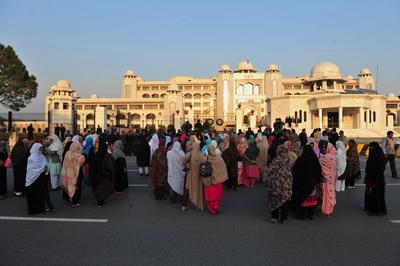It also brought forth broad condemnation in Pakistan and sparked large rallies in support of Malala and her fight for female education.
These expectations were clearly too high. The dogged nature of the problem of domestic terrorism in Pakistan, it is true, will not be turned around by a single incident: it requires a long, sustained campaign and the emplacement of conditions that suck its lifeblood dry.
There is, it seems, no strong national or bipartisan consensus yet on how to deal with domestic terrorism; nor are there any signs that extremism, justified by religion or ideology, is abating. The violence continues. Last month, many people were killed and injured in Karachi, Rawalpindi and other cities when extremists attacked Shiite religious processions. Two weeks ago, the equally shocking murder of five health workers on an internationally supported polio vaccination campaign, revealed yet again how vulnerable civil society is to the culture of terrorism.
The Inter-Services Intelligence agency and the military are accused of covertly supporting extremist networks in Pakistan for use in proxy wars in India and Afghanistan, and the military establishment is not fully accountable to the government or the public. Yet many lives, including those of thousands on Pakistani soldiers, have been lost in trying to push back the frontiers of terrorism. The Pakistani army has more than 140,000 troops engaged in operations against the militants along the Afghan border. Some 35,000 Pakistanis, including up to 7,000 soldiers, have died in the fighting since 2001. Dozens of Inter Service Intelligence men have died — notwithstanding the intelligence organisation’s collaboration with terrorist groups.
Where is Pakistan headed and can it find a way through?
However one might despair over the victory of violence over social order, Pakistan continues to lurch forward on a democratic course. Only a society that can offer a better set of ideas will triumph over destructive radicalism. Gradual entrenchment of the democratic ideal and the practice of democracy under the rule of law, with an independent judiciary and the removal of discrimination, including in women’s education, are signs of Pakistani progress.
The priority is to rebuild a languishing economy since stability within Pakistan and in the whole region is unlikely without economic stability and better economic opportunity for Pakistan’s 180 million people. Success in Pakistan’s desperate battle with terrorism and other violence will depend as much as anything else on whether the economy can be turned around, and dismal economic growth (of around 3 per cent last year) can be lifted to something more like that in China (8 per cent or more) to provide employment and income for increasingly disaffected youth. Growth and prosperity are powerful forces in marginalising discontent and strife. Pakistan has the talent, the professional infrastructure at the top, and now must develop an agenda for economic reform that, given the chance, could make the difference.
Mohsin Khan and Shuja Nawaz, in this week’s lead and contribution to our series looking at the year in review and the year ahead, note the challenging combination of circumstances with which Pakistan is currently confronted — a general parliamentary election likely to be held early in the year, and changes to the leadership of the army and judiciary under way, and the need to set the economy on track and attract sufficient external financing to avoid a potential balance-of-payments and currency crisis.
As Khan and Nawaz say, for the vast majority of Pakistanis, the threat of crime, unemployment, terrorism, political corruption and drugs is of greater concern than the political machinations currently going on in Pakistan. ‘The economic picture in Pakistan has remained quite grim since 2008. A growth rate hovering around 3 per cent, inflation running in double digits, fiscal deficits averaging 6–7 per cent of GDP and growing external imbalances all point to a bleak situation. The past year has generally followed this pattern with severe power shortages and financing constraints forcing the manufacturing sector to operate at only 50–60 per cent of capacity. These constraints, compounded by political uncertainties and a deteriorating security situation, have caused both domestic and foreign investment to fall significantly, creating a scenario of low growth in future years, when 7–8 per cent growth per year is needed to provide jobs for the steadily growing population’.
Khan and Nawaz point to three bright spots. The growth of middle-class consumption of autos and electronics suggest that the economy might be doing better than it is measured to be doing, because the informal economy has grown exceptionally strongly. International remittances, which have jumped to $13–14 billion this year, have also boosted consumption. And the bold move to normalise trade relations with India by the end of the year holds promise that Pakistan can at last realise its potential from opening to economic integration with India and across the rest of the region.
Opening Pakistan’s natural trading partnership with India will do much to drive domestic reform in Pakistan itself. In the end that too depends on continuing political will and the difficult political choice that the Pakistani people will make in the coming year. But it will also provide a powerful yet unobtrusive way for the rest of the world to help Pakistan find its way.
Peter Drysdale is Editor of the East Asia Forum.

